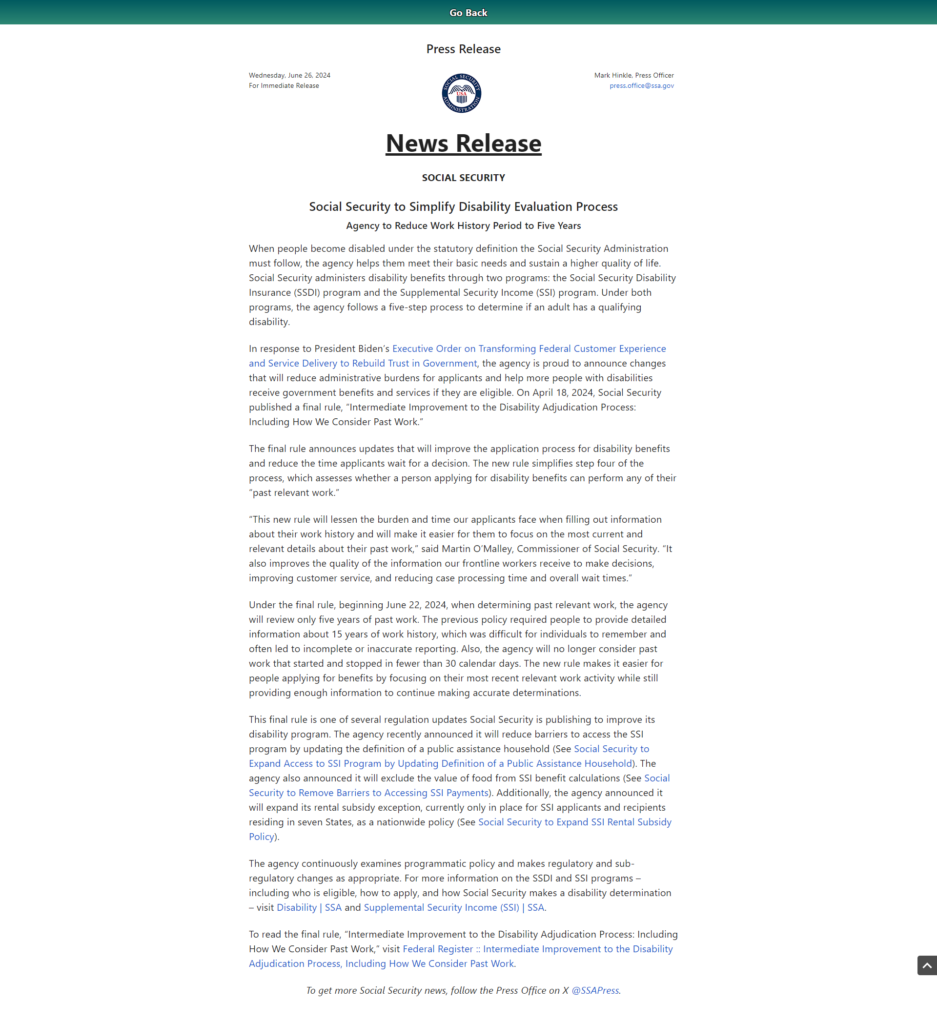The Social Security Disability Benefits (SSDI) program provides essential benefits to over 7 million disabled individuals in the United States, offering vital financial assistance to those permanently disabled and unable to work.
Recent developments have brought attention to significant revisions in the SSDI evaluation process, including the removal of 114 jobs from the list of viable career options for disability applicants, such as railroad telegrapher and reptile farmer.
Table of Contents
Evaluation Process
Both the SSDI and Supplemental Security Income (SSI) programs rely on a job list to evaluate an applicant’s capacity to work. This list, although outdated and no longer endorsed by the Department of Labor, remains crucial in determining disability status. If an applicant can potentially perform a job listed, they may be denied benefits.
The SSA is committed to modernizing this process. As stated by Martin O’Malley, Social Security Commissioner, identifying jobs that are rare or obsolete in the national economy is crucial. By eliminating these outdated occupations, the SSA ensures that their assessments reflect the current job market, thereby enhancing fairness in the determination process for applicants.
| $1600 July Stimulus Checks |
| $300 Child Tax Credit Update 2024 |
| $2000 Child Tax Credit 2024 |
| $120 Snap Ebt Payment |
| Snap $1500 Direct Deposit |
| Stimulus Check |
Recent Changes To Social Security Disability Benefits
When individuals meet the statutory definition of disability, the Social Security Administration (SSA) supports them by providing essential benefits through two main programs: Social Security Disability Insurance (SSDI) and Supplemental Security Income (SSI). The SSA employs a five-step process to evaluate if an adult qualifies for disability.
In alignment with President Biden’s Executive Order to enhance federal customer experience and rebuild trust, the SSA is implementing changes to ease the administrative burden on applicants, ensuring more people with disabilities receive the necessary government benefits and services if eligible.
“Intermediate Improvement to the Disability Adjudication Process: Including How We Consider Past Work” was the name of the final rule that the SSA released on April 18, 2024. There is more information that you must know about Social Security Disability Benefits, so keep reading to have complete knowledge about it.
This rule aims to improve the disability benefits application process and shorten decision wait times. Specifically, it streamlines step four, which examines whether an applicant can perform any of their “past relevant work.” Martin O’Malley, Commissioner of Social Security, emphasized that the new rule would simplify the work history information required from applicants, allowing them to focus on the most recent and relevant details. This change is expected to enhance the accuracy of the information used by SSA workers, improving customer service and reducing case processing and wait times.
Key features of the final rule, effective August 22, 2024, include:
- Limiting the review of past relevant work to the last five years, instead of the previous 15 years.
- Excluding past work that lasted less than 30 days from consideration.
These updates aim to make it easier for applicants to provide accurate work history information, focusing on recent and relevant work experiences.
Additionally, the SSA is implementing several regulatory updates to improve its disability program:
- Expanding access to the SSI program by updating the definition of a public assistance household.
- Excluding the value of food from SSI benefit calculations.
- Extending the rental subsidy exception, previously limited to seven states, to a nationwide policy.
These changes are designed to reduce barriers and improve access to SSI benefits for eligible individuals.
Here is the official press release of from the SOCIAL SECURITY in which Social Security Simplify the Disability Evaluation Process by reducing the Work History Period to Five Year.

Impact And Reception
The move to remove specific jobs from the SSDI evaluation process has garnered positive reception, particularly within the disability community. Many Americans with disabilities, who have historically felt marginalized by the system, view this as a crucial stride towards more equitable evaluations and improved access to benefits.
Nevertheless, lingering concerns persist regarding the enduring effects of the previous system. The outdated job list has posed substantial hurdles for numerous applicants over time, and while the recent changes by the SSA are promising, addressing the legacy issues may require a sustained effort over time.
Future Expectations
Moving forward, the SSA is poised to swiftly implement these changes, enhancing the prospects for new applicants to secure disability benefits. Through the modernization of evaluation criteria, the SSA strives to deliver a more precise and equitable assessment of applicants’ work capabilities, ensuring that deserving individuals receive the assistance they require.
| Google Bipa Settlement Payout Dates |
| Walmart Class Action Settlement |
| 2340 Increase Social Security July |
| 400 Direct Deposit |
| 1537 Direct Deposit Checks |
The Social Security Administration’s ongoing commitment to refining its processes underscores its dedication to effectively serving the disabled community. With these reforms underway, there is optimism that the SSDI program will become more accessible and impartial, accurately meeting the needs of disabled individuals nationwide.
In summary, the recent revisions to the SSDI determination process represent a significant stride toward equity and modernity. By eliminating obsolete job listings, the SSA is poised to provide enhanced support for disabled Americans, ensuring that the system operates effectively for its beneficiaries. This is all about Social Security Disability Benefits program, if there will be any changes or updates in it in future we will let you know.
FAQs
What is the SSDI program?
The SSDI program offers financial assistance to individuals permanently disabled and unable to work.
Why is the SSA changing its job list?
The SSA is updating its job list to ensure evaluations align with the current job market and promote fairness in the process.






